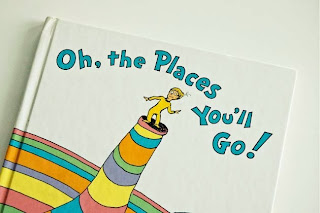by Gary Fearon, Creative Director, Southern Writers Magazine
A few years ago I accepted the occasional invitation to be a guest reader at elementary schools for Community Reader Day. Upon arriving, the teacher would have a book already picked out for me to read to the kids. I was surprised at how often the book of choice was Dr Seuss' Oh, the Places You'll Go!
It was always a pleasant surprise, since I enjoyed revisiting this pint-sized pep talk by the good doctor, and the kids seemed to get a lot out of it too.
I was even more pleasantly surprised to learn recently that Oh, the Places You'll Go! is popular not just with grade school children, but is a perennial favorite of adults who give it as graduation gifts, wedding gifts, and to others embarking on any new path of life.
In this classic tale, the protagonist (you) get to take a symbolic trip into your future, a land of unfamiliar trials and triumphs and ups and downs, always with the assurance that you will emerge the conquering hero. In the encouraging words of Dr Seuss, "And will you succeed? Yes! You will, indeed! 98 and 3/4 percent guaranteed!"
The most famous and powerful scene is one in which you come to a land called The Waiting Place, where everyone is just ... waiting. Waiting for the mail, or for Friday to come, or for a yes or a no, etc. In this city of stagnation, nothing ever happens because nobody takes action.
As we look back at the past year, how many of us can say that we didn't waste time in that Waiting Place? Did we stay true to our commitment to write every day? Did we keep regular submissions going out? Did we stay connected through writers groups and conferences? Or did we put off our writing goals, waiting for conditions to be just right (which of course they never are)?
With many of us coming up with new year's resolutions this week, I can't think of a better premise than to promise ourselves that we will not be victims of self-imposed inertia. Action does speak louder than words, and when we writers combine action with words, great things happen.
Southern Writers will do our best to help keep you motivated in 2014, beginning with this week's new January/February issue. Bestselling authors like p.m. terrell, Bob Mayer and Haywood Smith are just a few examples of those who make their writing dreams reality by perfecting their craft, and they gladly share their secrets with you.
This year we'll also be introducing an exciting new way for authors to enhance their online presence and attract new readers. Like Mic Nite, Must Read TV and Take Five, this new promotional tool will be free to all subscribers.
Each of us at Southern Writers wish you a new year filled with joy and success. Together we'll make great things happen in 2014. And that is 98 and 3/4 percent guaranteed!





.jpg)












.jpg)





